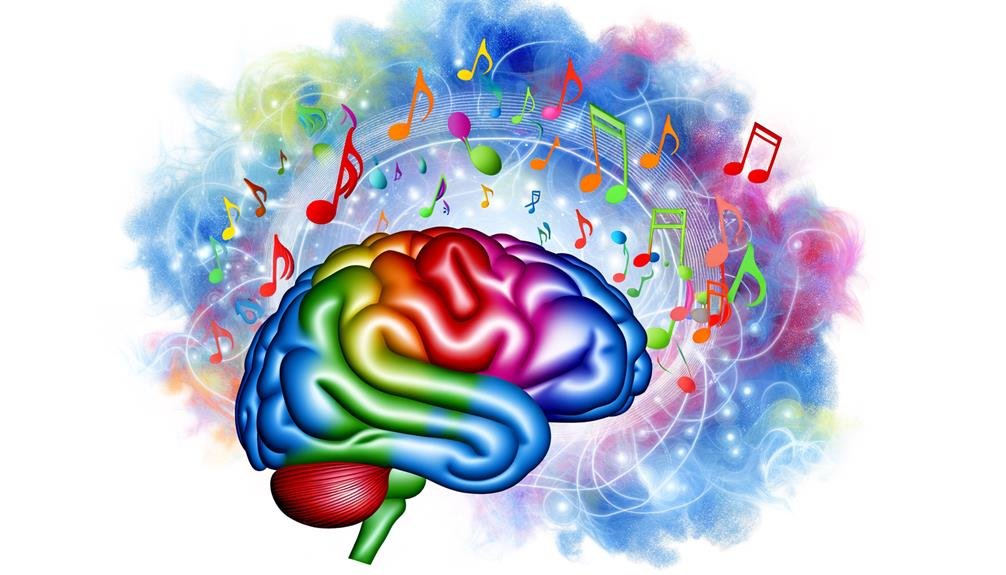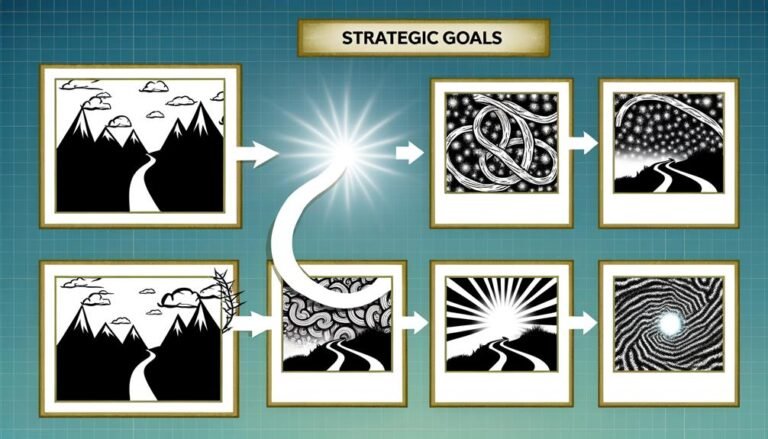Unlocking the Power of Your Brain Through Music
In a world where the enigmatic workings of the human brain continue to captivate researchers and enthusiasts alike, the intersection of music and neuroscience offers a profound avenue for exploration.
The intricate mechanisms through which music influences cognitive processes and emotional intelligence present an intriguing landscape waiting to be unraveled. By delving into the profound impact of musical engagement on brain function, we begin to uncover a realm of possibilities that holds the key to unlocking hidden potential within ourselves.
Join us as we embark on a journey to discover the transformative power of music on the human brain, igniting a spark of curiosity that beckons further exploration into this fascinating realm.
Key Takeaways
- Music engages specific brain regions, enhancing cognitive functions and memory.
- Playing instruments boosts problem-solving skills and emotional intelligence.
- Neuroplasticity allows learning music at any age, benefiting cognitive abilities.
- Harnessing music's power unlocks potential for improved learning, communication, and behavior.
The Neuroscience of Music
Unquestionably, the neuroscience of music delves into the intricate mechanisms underlying the human brain's profound response to auditory stimuli, elucidating the intricate interplay between music and cognitive functions.
Evolutionary significance is evident in the evolution of music as a native language influencing human development.
Emotional responses to music are deeply rooted in the brain's limbic system, triggering complex reactions tied to memory, motivation, and pleasure.
Studies reveal that music's emotional impact is linked to the release of neurotransmitters like dopamine and oxytocin, affecting mood and social bonding.
Understanding the neurological basis of emotional responses to music provides insights into how music has been a fundamental part of human culture and communication throughout history, shaping our social interactions and individual experiences.
Brain's Response to Sound Frequencies
The brain's intricate response to sound frequencies within the range of 20-20,000 Hz reveals a fundamental aspect of auditory processing and sensory perception. Sound frequency response plays a crucial role in how the brain interprets and interacts with the auditory environment.
One fascinating phenomenon related to sound frequencies is brainwave entrainment, where the brain synchronizes its electrical activity to the rhythm of the sound it is exposed to. This process can influence various cognitive states and emotional responses.
Understanding the brain's response to different sound frequencies provides insights into how music, as a complex arrangement of frequencies, can impact our brains and emotions.
- Sound frequency response
- Auditory processing
- Brainwave entrainment
- Sensory perception
- Cognitive and emotional impact
Specific Brain Regions in Music Processing
In the realm of music processing, distinct brain regions play crucial roles in orchestrating the intricate mechanisms involved in auditory perception and cognition. The auditory cortex, responsible for processing sound information, is central to music processing, enabling the brain to interpret and analyze musical elements.
Additionally, the hippocampus, known for its role in memory formation and retrieval, is activated during music listening, aiding in the encoding of musical sequences and emotional responses to music. Studies have shown increased hippocampal activation when individuals engage with music, suggesting a link between music processing and memory functions.
Understanding the specific brain regions involved in music processing, such as the auditory cortex and hippocampus, sheds light on the complex neural processes underlying our perception and appreciation of music.
Impact of Playing Instruments on Cognition
Engaging in instrumental music practice has been scientifically linked to notable enhancements in cognitive abilities. Playing instruments positively impacts cognitive development and musical intelligence through various mechanisms:
- Enhanced Memory: Regular practice improves memory recall and retention.
- Improved Problem-Solving Skills: Playing instruments sharpens analytical thinking and problem-solving abilities.
- Enhanced Emotional Intelligence: Music practice fosters emotional awareness and expression.
- Increased Focus and Attention: Playing instruments requires concentration, improving focus.
- Enhanced Multitasking Abilities: Coordinating different aspects of music performance enhances multitasking skills.
These cognitive benefits highlight the significant impact that playing instruments can have on an individual's cognitive abilities and overall brain function.
Brain's Predictive Capacity in Music
How does the brain demonstrate predictive capabilities when processing music? Musical anticipation and cognitive processing play a crucial role in the brain's pattern recognition and musical prediction abilities. When listening to music, the brain actively anticipates upcoming notes based on established patterns, engaging various regions such as the auditory cortex and hippocampus. This predictive capacity enables individuals to follow melodies, anticipate chord progressions, and even predict the rhythm of a piece. By continuously processing auditory information and comparing it to stored musical patterns, the brain creates a seamless listening experience. The table below highlights key aspects of the brain's predictive capacity in music:
| Music Processing | Cognitive Function | Brain Region Involved |
|---|---|---|
| Pattern Recognition | Anticipation of Notes | Auditory Cortex |
| Musical Prediction | Rhythm Expectation | Hippocampus |
| Melodic Anticipation | Harmony Recognition | Cerebellum |
Benefits of Music Engagement
Demonstrating the cognitive benefits of music engagement, the influence of musical involvement on cognitive functions, memory enhancement, emotional intelligence, and behavior is a subject of significant scientific inquiry. Music therapy has shown promising results in promoting emotional well-being. Music education plays a vital role in cognitive development, enhancing memory, problem-solving skills, and emotional intelligence. Engaging with music has been linked to improved behavior and social interactions. Additionally, participating in musical activities has been found to positively impact overall cognitive functions, contributing to neuroplasticity and enhancing brain health.
- Music therapy, emotional well-being
- Music education, cognitive development
- Memory enhancement through music engagement
- Improved behavior and social interactions
- Positive impact on overall cognitive functions
Applications in Talent Development
Utilizing music as a tool for fostering talent development showcases its potential to enhance cognitive abilities and nurture skills essential for personal and professional growth. Music has shown efficacy in talent recognition by identifying and honing individuals' innate abilities.
Through structured musical training, skill enhancement is achieved by refining cognitive functions, problem-solving techniques, and memory retention. The intricate patterns and sequences in music stimulate the brain's predictive capacity, aiding in pattern recognition and anticipation skills.
Moreover, engaging with music facilitates effective communication and emotional intelligence, crucial for personal and professional success. By integrating music into talent development programs, individuals can unlock their full potential and cultivate a diverse set of skills beneficial for various aspects of life.
Neuroplasticity in Learning Music
Neuroplasticity in learning music demonstrates the brain's remarkable ability to adapt and rewire in response to musical training. This phenomenon showcases the brain's incredible capacity to change and optimize its structure and function through music education. Key points to consider include:
- Music and creativity: Engaging with music stimulates creative thinking and expression.
- Neuroplasticity and learning efficiency: The brain's ability to reorganize itself enhances learning processes.
- Adaptation to new skills: Learning music prompts neural adaptations, improving cognitive functions.
- Enhanced memory retention: Musical training boosts memory consolidation and recall abilities.
- Emotional intelligence development: Music education fosters emotional awareness and regulation skills.
Cognitive Benefits Across Ages
Engaging with music at different stages of life offers a myriad of cognitive benefits that contribute to overall brain health and functioning. Music therapy has been shown to enhance cognitive development across various ages. In children, exposure to music aids in language development, memory formation, and emotional regulation.
For adults, engaging with music can help maintain cognitive skills, improve memory retention, and reduce the risk of cognitive decline associated with aging. Furthermore, music therapy has been utilized in the elderly population to support cognitive functions, promote social interaction, and enhance overall well-being.
These cognitive benefits highlight the importance of incorporating music into daily routines to support brain health throughout the lifespan.
Unlimited Potential Through Music
Harnessing the transformative potential of music for unlocking limitless cognitive abilities is a cornerstone of exploring the neural intricacies of the human brain. Music has the power to tap into brain plasticity, allowing for continuous learning and development at any age. Through musical therapy, individuals can leverage the following benefits to enhance their cognitive potential:
- Enhanced Neuroplasticity: Music fosters the creation of new neural pathways, promoting adaptability and cognitive growth.
- Emotional Regulation: Music can aid in regulating emotions, reducing stress, and improving mental well-being.
- Improved Memory: Musical engagement has been linked to enhanced memory retention and recall abilities.
- Enhanced Problem-Solving Skills: Music stimulates creative thinking and problem-solving capacities.
- Increased Focus and Attention: Engaging with music can boost concentration levels and attention span.
Conclusion
In the symphony of life, the brain's harmonious dance with music orchestrates a mesmerizing symphony of cognitive growth and emotional resonance.
Like a conductor guiding an ensemble, music unlocks the brain's hidden potential, shaping learning, memory, and behavior with precision and finesse.
Through the lens of neuroscience, we glimpse the intricate interplay between melody and mind, revealing a vast landscape of untapped possibilities awaiting exploration and mastery.
Embrace the transformative power of music, and unlock the symphony within.







